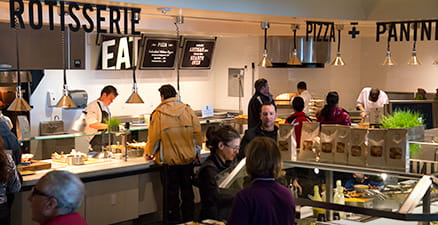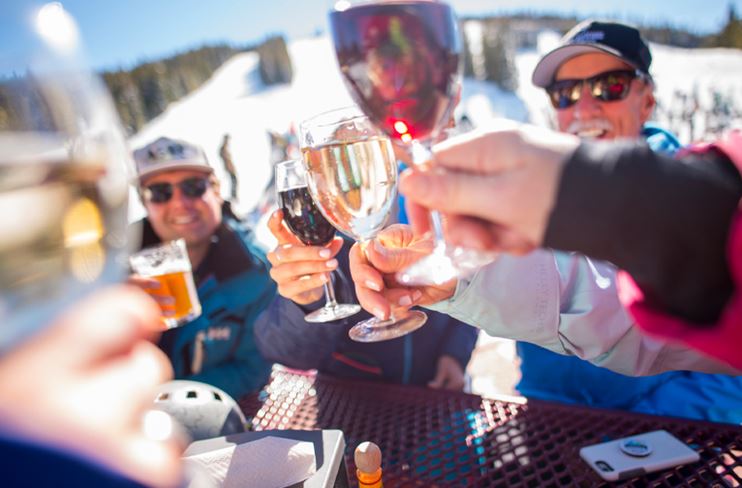Keeping It Local And Sustainable At Aspen Snowmass Restaurants

Aspen Snowmass has long been committed to operating a four-mountain resort in the greenest way possible.
From generating carbon-negative energy at a nearby coal mine to qualifying for LEED certification in four of our buildings, our resort has always gone the extra mile to demonstrate a commitment to our environment.
That desire carries over to our acclaimed restaurants as well.
Lead by our Culinary Director Jim Butchart and our Environmental Foundation, we’ve followed through on several promises to keep the environmental impact of our restaurants — and the food they serve — to a minimum. Here’s how.
From generating carbon-negative energy at a nearby coal mine to qualifying for LEED certification in four of our buildings, our resort has always gone the extra mile to demonstrate a commitment to our environment.
That desire carries over to our acclaimed restaurants as well.
Lead by our Culinary Director Jim Butchart and our Environmental Foundation, we’ve followed through on several promises to keep the environmental impact of our restaurants — and the food they serve — to a minimum. Here’s how.
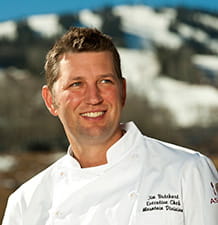
Sourcing Local Foods
Fortunately for everyone, the most environmentally friendly practice also translates into the most flavorful food. Sourcing local ingredients — such as produce, poultry, dairy and more — not only helps the local economy and reduce our carbon footprint, but it also delivers the freshest, most flavorful food for our guests.
“We get a good deal of our product from producers in our valley, the Western Slope and the Front Range,” notes Jim Butchart. “And we’re searching every possible avenue to find even more local foods. But the biggest challenge is that very little is growing in our valley when we have the highest demand in winter.”
Because of this, our food and beverage team is helping local growers apply for grants that will allow them to build out infrastructure for supplying local produce in winter. Money from these grants can go toward building high tunnels for year-round growing or even increasing staff.
“We’re not going to be complacent and say ‘oh, it is what it is, we can’t source locally in winter.'” Jim adds. “We’re actively finding ways to get what we’re looking for, which is even fresher ingredients.”
“We get a good deal of our product from producers in our valley, the Western Slope and the Front Range,” notes Jim Butchart. “And we’re searching every possible avenue to find even more local foods. But the biggest challenge is that very little is growing in our valley when we have the highest demand in winter.”
Because of this, our food and beverage team is helping local growers apply for grants that will allow them to build out infrastructure for supplying local produce in winter. Money from these grants can go toward building high tunnels for year-round growing or even increasing staff.
“We’re not going to be complacent and say ‘oh, it is what it is, we can’t source locally in winter.'” Jim adds. “We’re actively finding ways to get what we’re looking for, which is even fresher ingredients.”
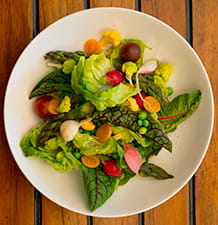
Serving Locally Raised, Grass-Fed Beef
Along similar lines, Aspen Snowmass gets all of its beef — for 12 restaurants across all four mountains — from local ranches. Case in point, we’ve recently developed a partnership with Carbondale-based Crystal River Meats. Supporting local ranches who raise grass-fed beef not only reduces the energy needed to raise and transport beef, but it also helps the local economy.
“We want to support the local economy. That has always been our goal,” notes Jim. “One way to do that, is to support local ranchers, such as Crystal River Meats.”
In the case of Crystal River Meats, it’s an operation that has stayed family-run for generations.
“They’re real cowboys,” Jim laughs. “I tell my chefs that when I can’t get a hold of Tai to place the order, its because he’s out there on his horse ranching. It’s the kind of thing we want to support for many reasons.”
“We want to support the local economy. That has always been our goal,” notes Jim. “One way to do that, is to support local ranchers, such as Crystal River Meats.”
In the case of Crystal River Meats, it’s an operation that has stayed family-run for generations.
“They’re real cowboys,” Jim laughs. “I tell my chefs that when I can’t get a hold of Tai to place the order, its because he’s out there on his horse ranching. It’s the kind of thing we want to support for many reasons.”
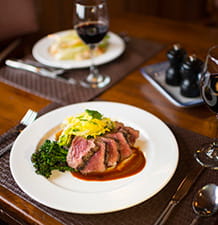
Expanding Our Composting Program
In addition to having a comprehensive recycling program, Aspen Snowmass has also enhanced its composting initiative.
“Logistically, it’s not easy to pull off composting across the mountains,” Jim admits. “We have to have special trash bags, we have to haul it down the mountain with a snowcat, and then we have to deposit it in special containers at the bottom. But it is something we’re committed to, and we’re looking to keep expanding it because it is important.”
Currently, six restaurants on Snowmass compost in the kitchen, while both restaurants on Buttermilk compost in the front- and back-of-the-house.
“None of these things help the bottom line,” Jim admits. “But at the same time, we don’t want to transfer these operational costs to our guest. We do these things because they’re the right thing to do.”
“Logistically, it’s not easy to pull off composting across the mountains,” Jim admits. “We have to have special trash bags, we have to haul it down the mountain with a snowcat, and then we have to deposit it in special containers at the bottom. But it is something we’re committed to, and we’re looking to keep expanding it because it is important.”
Currently, six restaurants on Snowmass compost in the kitchen, while both restaurants on Buttermilk compost in the front- and back-of-the-house.
“None of these things help the bottom line,” Jim admits. “But at the same time, we don’t want to transfer these operational costs to our guest. We do these things because they’re the right thing to do.”
Find A Restaurant
About The Author

KEVIN DAY
Kevin Day is a Colorado-based writer, photographer and content developer. Born and raised in Denver, he has been skiing since he was 12 years old and hiking since he could walk. His obsession with the mountains, food and wine has taken him all over Colorado, as well as Italy, Switzerland, Germany and Ecuador.
He has also done volunteer trail work with the Colorado Fourteeners Initiative, including a stint on Pyramid Peak.
Kevin Day is a Colorado-based writer, photographer and content developer. Born and raised in Denver, he has been skiing since he was 12 years old and hiking since he could walk. His obsession with the mountains, food and wine has taken him all over Colorado, as well as Italy, Switzerland, Germany and Ecuador.
He has also done volunteer trail work with the Colorado Fourteeners Initiative, including a stint on Pyramid Peak.
